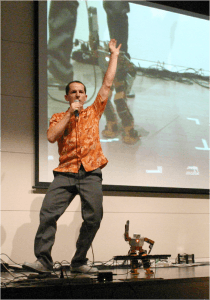Researchers of L-CAS are studying how mobile robots can learn from long-term experience to provide service in security and care scenarios. As part of the European STRANDS project, they contribute to the development of robots that are able to operate autonomously, without the need of human intervention, in regular indoor environments like offices and homes over long periods of time.
The 4 year project involving six academic partners from Lincoln, Birmingham, Leeds, Vienna, Aachen, and Stockholm has started in April this year. The EU robotics week is the project’s first major milestone to show their robots working continously and autonomously at the different sites. Lincoln’s robot “Linda” is patrolling its surrounding 24/7 during this week as part of the “STRANDS robot marathon”.
 Linda faces the challenge to safely and reliably navigate an environment that is populated by people and not customised to a robot’s needs. She will have to cope with changes that occur, such as lights being turned on and off, objects moved about, and people walking around. During the whole week Linda will be streaming live to the internet where the public can follow Linda on her patrol routes every day and night. Linda can be seen patrolling, charging autonomously, and visiting checkpoints that have been defined by the researchers. While this is the first step towards autonomous robots that can assist and help people, the STRANDS project ultimately aims to deploy robots like Linda to other sites where they will complement human guards to increase security and help staff in care facilities, facilitated by the project partners G4S and AAF, respectively.
Linda faces the challenge to safely and reliably navigate an environment that is populated by people and not customised to a robot’s needs. She will have to cope with changes that occur, such as lights being turned on and off, objects moved about, and people walking around. During the whole week Linda will be streaming live to the internet where the public can follow Linda on her patrol routes every day and night. Linda can be seen patrolling, charging autonomously, and visiting checkpoints that have been defined by the researchers. While this is the first step towards autonomous robots that can assist and help people, the STRANDS project ultimately aims to deploy robots like Linda to other sites where they will complement human guards to increase security and help staff in care facilities, facilitated by the project partners G4S and AAF, respectively.
Follow Linda live on the internet.
